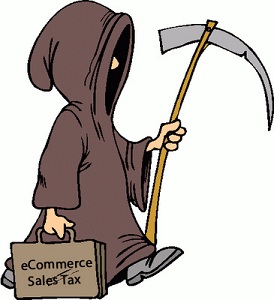What taxes do I need to pay and what taxes are the manufacturer’s liability? Moreover, on which amount should I (and the manufacturer) pay the taxes?
E-commerce is the buzzword nowadays. Because of the convenience it offers of buying things sitting in your home or office it is becoming increasingly popular. Many big and small companies are riding on the bandwagon of e-commerce.
However, law is still not very lucid on the transactions done on an e-commerce site. For example, e-commerce transactions, irrespective of the type of business model used by the operators, will be subject to certain taxes. Since ignorance of law is no excuse, let us explore about these taxes, their impact on the business and the method to comply with them in order to run the business smoothly.
 There are basically three types of taxes to be considered:
There are basically three types of taxes to be considered:
• Value Added Tax, or VAT is a state levy, applicable on sales made by registered dealers within the confines of the state (intra-state).
• Central Sales Tax, or CST is a central levy applicable on cross border transactions (inter-state).
• Service tax is a central levy applicable to the service component of the business.
The state and central governments separately specify respective rates of taxation (VAT, CST and Service Tax) for various products based on classification etc.
The business model adopted by a company determines how its e-commerce transactions will be taxed as detailed below.
1. Business to Customer
In this business model, the e-commerce company sells goods directly to the customers. Such transactions will be subject to VAT or CST depending on whether it is an intra-state or inter-state transaction.
Intra-state sales:
If buyer and seller are situated in the same state, the taxation will be as per the respective state VAT ( Ex. In Karnataka the tax rates are 1%, 2%, 5.5%, 14.5% depending on the nature of the goods)
Inter-state sales:
When the transaction is carried out between parties situated in two different states, such sales are governed by Central Sales Tax. The rate applicable for particular goods will be taxed according. (i.e.1%, 2%, 4%, 12.5%). In such transactions, one will have to apply either the VAT rate or the rate as mandated by the CST Act, whichever is lower.
2. Manufacturer, E-commerce Company and Customer
The e-commerce company collects orders on its web site, issues an invoice to its buyer and gives the order to the manufacturer to deliver the product. Assuming all the three parties are in the same state, the e-commerce company will collect VAT from the customer. The manufacturer will collect VAT from the e-commerce company. The e-commerce company can offset VAT collected by it from the customer with the VAT it paid to the manufacturer. The courier company will charge Service Tax to the manufacturer. If the e-commerce company is taking delivery charges, it will have to charge Service Tax on this fee.
3. Customer to Customer
In customer to customer transactions, the web site does not sell anything directly but provides a platform for two customers to come together for doing sale and purchase transaction. The web site in turn charges a commission for bringing them together. The commission charged by the web site is a service fee and Service Tax has to be collected by the e-commerce company. In such transactions, there is no concept of Sales Tax.
Disclaimer: This is only about information and does not purport to be specific legal advice. For any specific query, readers are advised to contact their legal consultants. [If you wish to share your expert opinions with our community, do get in touch with us at editor@startupfreak.com]
 Startup Freak Community for entrepreneurs and small businesses
Startup Freak Community for entrepreneurs and small businesses






